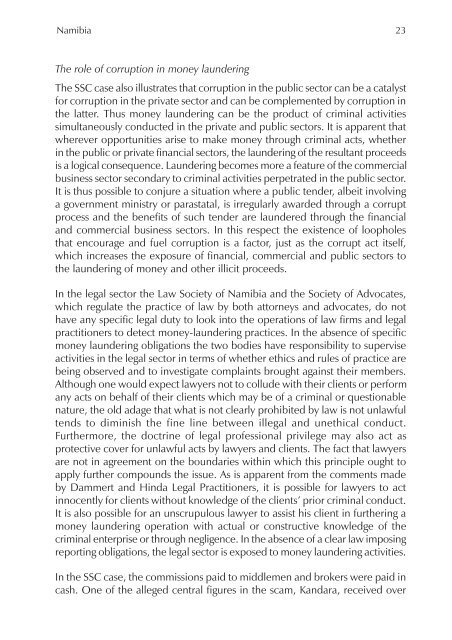Monograph 108 complete download - Institute for Security Studies
Monograph 108 complete download - Institute for Security Studies
Monograph 108 complete download - Institute for Security Studies
Create successful ePaper yourself
Turn your PDF publications into a flip-book with our unique Google optimized e-Paper software.
Namibia<br />
23<br />
The role of corruption in money laundering<br />
The SSC case also illustrates that corruption in the public sector can be a catalyst<br />
<strong>for</strong> corruption in the private sector and can be complemented by corruption in<br />
the latter. Thus money laundering can be the product of criminal activities<br />
simultaneously conducted in the private and public sectors. It is apparent that<br />
wherever opportunities arise to make money through criminal acts, whether<br />
in the public or private financial sectors, the laundering of the resultant proceeds<br />
is a logical consequence. Laundering becomes more a feature of the commercial<br />
business sector secondary to criminal activities perpetrated in the public sector.<br />
It is thus possible to conjure a situation where a public tender, albeit involving<br />
a government ministry or parastatal, is irregularly awarded through a corrupt<br />
process and the benefits of such tender are laundered through the financial<br />
and commercial business sectors. In this respect the existence of loopholes<br />
that encourage and fuel corruption is a factor, just as the corrupt act itself,<br />
which increases the exposure of financial, commercial and public sectors to<br />
the laundering of money and other illicit proceeds.<br />
In the legal sector the Law Society of Namibia and the Society of Advocates,<br />
which regulate the practice of law by both attorneys and advocates, do not<br />
have any specific legal duty to look into the operations of law firms and legal<br />
practitioners to detect money-laundering practices. In the absence of specific<br />
money laundering obligations the two bodies have responsibility to supervise<br />
activities in the legal sector in terms of whether ethics and rules of practice are<br />
being observed and to investigate complaints brought against their members.<br />
Although one would expect lawyers not to collude with their clients or per<strong>for</strong>m<br />
any acts on behalf of their clients which may be of a criminal or questionable<br />
nature, the old adage that what is not clearly prohibited by law is not unlawful<br />
tends to diminish the fine line between illegal and unethical conduct.<br />
Furthermore, the doctrine of legal professional privilege may also act as<br />
protective cover <strong>for</strong> unlawful acts by lawyers and clients. The fact that lawyers<br />
are not in agreement on the boundaries within which this principle ought to<br />
apply further compounds the issue. As is apparent from the comments made<br />
by Dammert and Hinda Legal Practitioners, it is possible <strong>for</strong> lawyers to act<br />
innocently <strong>for</strong> clients without knowledge of the clients’ prior criminal conduct.<br />
It is also possible <strong>for</strong> an unscrupulous lawyer to assist his client in furthering a<br />
money laundering operation with actual or constructive knowledge of the<br />
criminal enterprise or through negligence. In the absence of a clear law imposing<br />
reporting obligations, the legal sector is exposed to money laundering activities.<br />
In the SSC case, the commissions paid to middlemen and brokers were paid in<br />
cash. One of the alleged central figures in the scam, Kandara, received over
















